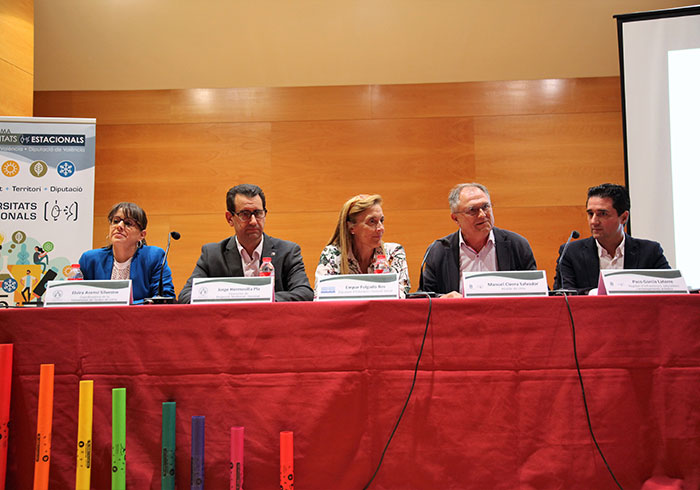
The second edition of this seasonal university, an initiative of the Universitat de València, developed in collaboration with the City of Llíria and with the participation of the Valencian Provincial Council, analyzes music as an essential part of the musical heritage of this city coinciding with its candidacy to join the Network of Creative Cities of UNESCO in the form of music.
The second edition of the Universitat de Tardor of Llíria (Autumn University of Llíria), which opened Wednesday 16th October at the Conservatory of Llíria, has opened a double day of debates aimed at the public in which music is analyzed as an essential part of their heritage from a double perspective, taking into account, on the one hand, the teaching of music and, on the other, its evolution throughout history in this territory.
The Universitat de València, in its commitment to the territory and thanks to the collaboration of Llíria City Council and the participation of the Valencian Provincial Council, has organized this academic action, linked to education, research and knowledge transfer, which aims to consolidate itself in Llíria and Camp de Túria as a meeting point for specialists from different fields with local citizens and their immediate surroundings.
The conference, which is free and open to all citizens and was inaugurated yesterday, has the participation of lecturers from the Universitat de València, as well as local musicologists, teachers, professors and historians who share their keys to understanding Llíria's close relationship with musical art. The current edition, whose motto is Llíria, Ciutat de la música. Història i Educació (Llíria, city of music. History and Education), has on the horizon Llíria's candidacy to join UNESCO's Creative Cities Network in the music category, which represents a leap in its international recognition.
This was highlighted at the opening ceremony yesterday by the Mayor of Llíria, Manuel Civera; the local coordinator for Education and Social Inclusion, deputy Empar Folgado; the vice-Principal of the Office for Territorial Projection and Participation of the Universitat de València, Jorge Hermosilla; the coordinator of the Universitat de tardor of Llíria, Elvira Asensi; and the councilor for Educational Infrastructures and Artistic Teaching of Llíria, Paco García. All of them applauded the interinstitutional collaboration in the implementation of this initiative for the transfer and exchange of knowledge in relation to cultural heritage which, in the case of Llíria, is clearly linked to music.
Yesterday's conferences addressed the aspect of music education in different educational settings. Marcel·lí García Peruga, teacher at the CRA Alt Carraixet in Olocau-Gàtova, who will hold an exhibition entitled Fem música a l'escola: entre la tradició i la innovació. Juguem? (We make music at school: between tradition and innovation. Wanna play?); Concepción Enguídanos, teacher at IES Camp de Túria de Llíria, with her work on La Música en l'Ensenyament Secundari i Batxillerat: experiències des de la IES Camp de Túria de Llíria (Music in Secondary and Baccalaureate Education: experiences from the IES Camp de Túria de Llíria); Ana Mª Botella, from the Department of Teaching of Musical, Visual and Corporal Expression at the Universitat de València, who will speak on L'educació musical a la Universitat de València (Music education at the Universitat de València); and Amparo Esteve, director of the Conservatory of Llíria, who will focus her presentation on Conservatori de Llíria: 26 anys formant, educant i fent música (Conservatory of Llíria: 26 years of training, educating and making music). The interventions ended with a debate open to the public, moderated by Ana Botella.
This afternoon's session, starting at 6 p.m., will analyze the evolution of music in Llíria throughout history. Antoni Llibrer, Doctor in History and lecturer at the Universitat de València, will give the lecture De la aljama a la Llíria feudal: ulemas, llauradors, preveres i músics (s. XI-XV) (From the aljama to the feudal Llíria: ulamas, peasants, presbyters and musicians from 11th century to 15th century); Jota Martínez, musician specialized in instruments from the Spanish medieval tradition, will talk about Com sona la Llíria del segle XIII (How the Llíria of the 13th century sounds); Francesc Rozalén, historian, about La Llíria Moderna (The Modern Llíria); and Andrea Bombi, musicologist and lecturer in the Department of Italian Philology at the Universitat de València, about Música en l’Edat Moderna (Music in the Modern Age).
Today's conferences will conclude with a debate moderated by Joan Josep Adrià i Montolio, Doctor in History and lecturer at the IES Camp de Túria de Llíria.
About Seasonal Universities
The Universitat de València, through the Office of the Vice-Principal for Territorial Projection and Participation, has, over the last few years, set up a network of seasonal universities a name derived from the fact that they focus their activities on the same season of the year — which offer an interesting programme of free days, aimed at citizens of all ages.
Nowadays, the network is made up of 12 universities, located in as many municipalities and distributed throughout the different regions of the province, both inland and along the coast. Each one of them develops its programmes around a monographic theme linked to its particular idiosyncrasy, history and culture, under the coordination of a specialist in the subject.
The network consists of Alzira (Environment); Xàtiva (Cultural, oenological and natural tourism); Ademús (Landscapes of opportunity); Aras de los Olmos (New technologies, Astronomy and Development); Gandia (Laws of the World); Sagunt (Heritage of Humanity); Bunyol (Musical Heritage); Alaquàs (Analysis of the Castell-Palau d’Alaquàs); Llíria (Music, society and territory); Enguera (Rural development and new technologies); Ontinyent (Talent, opportunities and development); and L'Eliana (Smart city). Thanks to the collaboration of the Valencian Provincial Council, the network will be made up of 20 sites in 2020.










